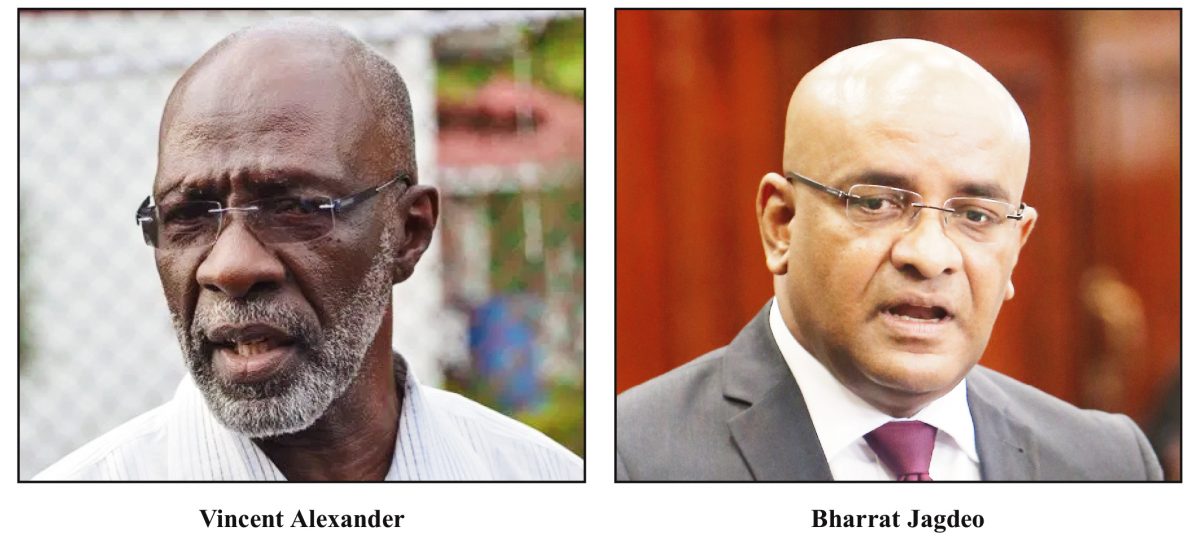The International Decade for People of African Descent Assembly-Guyana (IDPADA-G) has disputed claims by Vice President Bharrat Jagdeo that it has misused monies received, while maintaining that its funding has been allocated to various developmental projects for Afro-Guyanese.
Last Friday, Vice President Jagdeo accused IDPADA-G’s founding members of using the Afro-Guyanese community for personal benefit. “Find out how much of the money [IDPADA-G receives] goes to normal Afro-Guyanese,” he told reporters, while claiming that since its founding it had received a total of $468 million from the government to promote the economic advancement and empowerment of Afro-Guyanese.
At a news conference on Monday, Co-founder Vincent Alexander said founders are not beneficiaries of the not-for-profit company.
“Every cent of IDPADA-G’s subvention or other revenue is spent in service to the African Guyanese community, indirectly as in the case of salaries or directly through programmes, projects, engagements, and financial assistance,” Alexander said.
He also said that founding members of IDPADA-G are volunteers and do not benefit from the company.
While IDPADA-G is not generally funded to provide grants, he added, in 2018, the company received $10 million from the Ministry of Finance for grants to be distributed among Afro-Guyanese. This was largely distributed in 2018 and 2019.
“A residual sum of approximately G$343,000 was disbursed in 2020. To suggest that of a subvention of G$100 million in 2020, the community was merely the beneficiaries of grants to the tune of $343,000.00 is either malicious or gross incompetence in relation to the understanding of the financial situation of IDPADA-G,” Alexander explained in reference to claim made by Jagdeo.
As it relates to what IDPADA-G staff is paid to do, he said, they give service to the African Guyanese community by preparing business plans, projects, and grant request proposals for government and donor funding.
“The sum that Mr. Jagdeo did not mention goes towards projects in the sphere of education and training, disaster response, public education, entrepreneurial facilitation, and youth development, to mention a few,” he said.
He also alluded to a $5 million exercise to register
persons for flood relief, due to their omission by state operatives. “Mr. Jagdeo, therefore, grossly misrepresented the work that is done by IDPADA-G, and how its subvention is spent on its engagements with the Guyanese of African descent.
“Every cent of IDPADA-G’s subvention or other revenue is spent in service to the African Guyanese community, indirectly as in the case of salaries or directly through programmes, projects, engagements, and financial assistance,” he maintained.
He also revealed that IDPADA-G formally requested an increase in $58 million in 2020 and 2021 but this was turned down both times.
“We were advised that that request would not be honoured and, therefore, we have not gotten the specific money for grant purposes,” he said.
Alexander noted that the relevant financial documents were requested and obtained from IDPADA-G on the morning of Jagdeo’s press conference. “Such was IDPADA-G’s openness and efficiency in providing documents, only for them to be misused by the Vice-President,” he lamented.
At the press conference on Monday, IDPADA-G’s Chief Executive Officer Olive Sampson said that projects are being undertaken by the company in areas such as capacity building, tuition assistance and scholarships, entrepreneurial skills training and development, youth development, flood relief survey, COVID-19 and humanitarian assistance and the preservation and teaching of African history.
For capacity building-related projects, IDPADA-G spent $22,386,555 in 2018; $44,324,848 in 2019, and GY$11,762,671 in 2020, she noted. For tuition assistance/scholarships at the secondary and tertiary levels, she said $1,879,036 was spent in 2018, $2,083,751 in 2019, and $1,846,140 in 2020, while for re-opening of night schools closed after August 2020, some $3,048,000 was spent.
Despite the company’s position, Jagdeo on Monday maintained there was a misuse of funding.
He questioned how much of $100 million allocated annually since 2019 and $68 million in 2018 was spent on paying salaries, who are individuals that were paid, what amounts were they being paid and how were they selected. He also questioned how much of that sum was spent on rental, who owns the buildings rented, and what process was used for the selection of the buildings, among other things.





